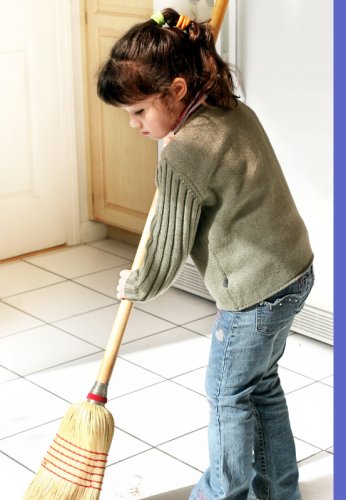By Maureen Monfore, www.ChildwiseChat.com
It’s back-to-school season! Have you bought school supplies,
backpacks, and lunch boxes? Are you thinking ahead to your back-to-school
routines? This can be a hectic time of year as we prepare for the school year
ahead, but for many of us, the return to a regular routine is refreshing.
As kids head back to school it may be more difficult for
them to keep up with chores. Between school, sports, music lessons, and play dates,
our kids are busy! And sure, school is their job, so homework should come
before housework, but chores should not be neglected.
Teaching kids the responsibility of cleaning up after
themselves and helping out around the house is as important a lesson as any
they’ll receive at school. Here are a few tips to help them manage school and
chores successfully:
Help them prioritize
Learning to prioritize competing tasks is an important
skill. Imagine your daughter has a heavy homework load, but she also needs to
empty the dishwasher. Sure, homework is more important, but if she quickly
empties the dishwasher first, she can devote the rest of her evening to
homework. It’s no fun doing homework with a chore hanging over your head. So
teach them how to prioritize and how it’s usually better to do the quickest
jobs first.
Show them that they
have control over chores
The most important chore for kids is to simply clean up
after themselves. That can mean putting dirty clothes in the hamper, putting
bikes back in the garage, or putting toys away. But when we team them a few
simple tips, they’ll learn that they have control over the task.
My kids often make a giant mess with their Legos when
they’re playing. And they often like to move onto other toys before they clean
up the Legos. But it’s my job to teach them that it’s much easier to clean as
you go than to face a giant mess at the end of the day. The same goes with
putting dirty clothes in the hamper. It’s much easier to put them in the hamper
as you undress than to throw them on the floor and pick them up later.
Avoid “chore bore”
with variety
Doing the same chore day after day or week after week can
get tiring. You can spice things up and reduce the amount of groans you hear by
improving the variety of chores. Rotate the kids through all the jobs. This
eliminates any complaining about whose job is harder and who is or isn’t
pulling their weight.
One fun way to improve variety is to create chore sticks.
Write the names of chores on popsicle sticks and have the child choose a chore.
As an incentive, include a “free pass” option.
Enlist their help
often
Despite how busy their lives get, there’s always time to
help mom and dad out. It’s important to teach them the value of doing a chore
when you see that it needs to be done. The only way to get them there is to
point out when you need their help, throughout the day. Even if it’s not on
their official list of chores, have them help you bring in the groceries, put
food away, carry laundry upstairs, throw a load in the wash when your hands are
tied, and more.
There’s no reason you should carry the brunt of all of the
housework. Sure, it may be easier to do it yourself, especially when all you
hear are complaints, but remember that teaching responsibility through
housework is an important life lesson that no teacher or coach will ever teach
them.
Reward them with an
allowance
There are many schools of thought out there when it comes to
allowance, but I’m usually of the opinion that we should give our kids an
allowance for doing their part to keep the household running. We live in a
capitalistic society, and almost everyone gets paid for his or her work. (Moms
get paid in hugs and kisses.)
The only time an allowance can get troublesome is when we
tie chores directly to a monetary value. The risk is that the child will choose
to forego the money in order to get out of doing the chore. So make sure they
know that this isn’t an option. They must do chores whether they receive an allowance
or not.
Require a happy heart
Speaking of groans and complaints, require your kids to do
chores with a happy attitude. They will never do chores willingly or offer to
do them without being asked if they are always allowed to whine and complain
about them.
When you give a child a chore and are met with resistance,
you might give a verbal warning the first time. After that, have the child do
double duty. Or if one child meets a chore happily while the other does not,
have the complaining child do his sibling’s chore. That way, you’re giving the
complaining child a consequence while rewarding the other child for not
complaining.
And always be sure to offer a reward (even verbal praise)
when a child does a chore without being asked. That’s the ultimate lesson in
teaching responsibility, so when it happens encourage it!
Maureen Monfore is a homeschooling
mother of two young boys, a marketing consultant, and the author ofChildwiseChat.com and the eBook, Live in Harmony with First-Time Obedience. A loyal follower of the teachings of Gary
and Anne Marie Ezzo, she is passionate about teaching children to obey to pave
the way for fun, love, learning, and essential moral development.

